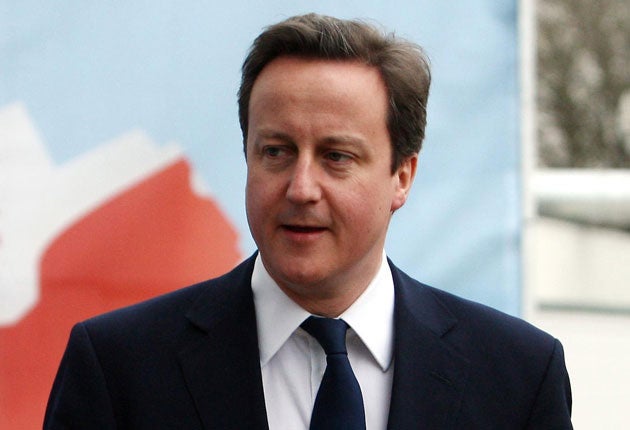Military chiefs sign letter calling for rethink on defence
Dozens of leading officers and experts say strategic defence review was profoundly flawed

David Cameron is under mounting pressure to perform a U-turn amid claims his military blueprint for the future defence of Britain is flawed and costing lives on the frontline.
Dozens of Britain's most respected military leaders, politicians, academic experts and forces families groups have signed a letter in The Independent on Sunday, calling on the Prime Minister to reopen the Strategic Defence and Security Review (SDSR), barely five months after it was completed.
The move has been prompted after the wave of popular uprisings in North Africa exposed serious concerns over Britain's long-term military planning – not least the controversial decision to axe the Harrier jump jet fleet and HMS Ark Royal.
One of Britain's most respected military figures, Admiral Sir John "Sandy" Woodward, commander of Britain's taskforce during the Falklands War, condemned the disposal of Britain's Harrier jump jets. "Lives are being lost in the front line where the Harriers were maintained at 20 minutes' notice for sortie. The Tornadoes, because they are so old and decrepit, have to be given 24 hours' notice," he said.
The admiral is one of 50 people to have signed a letter in the IoS, warning how the "security landscape has radically changed" as a result of events in Egypt, Tunisia and Libya.
Other signatories include Admiral Lord West, former First Sea Lord, Major General Julian Thompson, former commander of the Royal Marines, Julie McCarthy, chief executive of the Army Families Federation and Baroness Brenda Dean, chairman of the House of Lords Defence Group.
The SDSR, published in October, failed to mention North Africa. The Government has been criticised for its slowness in evacuating Britons from Libya in particular. The main frigate eventually used to get hundreds to safety, HMS Cumberland, is one of more than 260 ships and planes to be axed under plans to downsize Britain's armed forces.
Mr Cameron, who will condemn Labour's economic legacy in a speech to his party today, has described the review as "a clear vision for the future structure of our armed forces".
The Defence Secretary, Liam Fox, said last night that the coalition's scope for action had been limited by the policies of the previous government. He added: "The SDSR has allowed us to re-shape the armed forces to face future threats, making our military more adaptable and flexible."
But critics claim the review was the product of bad advice, short-term thinking and a need to meet large cuts demanded by the Treasury.
General Sir Michael Rose, former adjutant general of the army, said: "The abandonment of the Sea Harriers and the reduction of aircraft carriers from two to one are probably the two most damaging elements of the defence cuts in relation to the projection of military power in the sort of situation that confronts us in Libya."
Commander Nigel Ward, a decorated veteran of the Falklands War, warned Britain's military capability was "sinking into oblivion".
Several Conservatives, while declining to sign the letter, backed the call for a rethink. A former chief of the general staff, Gen Sir Richard Dannatt, said: "There are moments in history when any government might wish to re-evaluate its security and defence policies and priorities. Events in North Africa and the Middle East constitute one such moment."
Mr Fox and the Foreign Secretary, William Hague, will next week face MPs on the defence select committee over the review and failures exposed by events in the Arab world.
Later this week, Mr Cameron will meet other EU leaders to plot the response to events in Libya, hoping to regain the initiative after a series of gaffes, including talking up a possible military no-fly zone, which Britain would struggle to enforce.
Senior military figures have produced a briefing, now being circulated within the Cabinet, which contradicts Mr Cameron's optimism that Britain could play a meaningful role if a no-fly zone was needed over Libya. It warns: "The resources required in terms of land-based fighter aircraft and supporting units for the enforcement of such a zone are significantly greater than those available within the British military inventory."
Mr Cameron will today give further clues to the content of the Budget, when he praises the importance of enterprise to Britain's economic revival. He will also pledge to back business against the "enemies of enterprise", identified as government bureaucrats and local officials.
Subscribe to Independent Premium to bookmark this article
Want to bookmark your favourite articles and stories to read or reference later? Start your Independent Premium subscription today.

Join our commenting forum
Join thought-provoking conversations, follow other Independent readers and see their replies